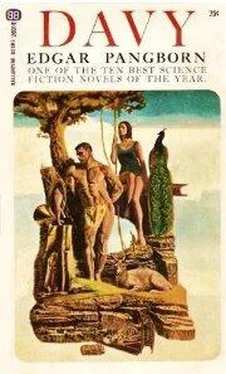Everywhere, it is the duty of a citizen to kill a mue on sight if possible, but to proceed with caution, because the monster’s demon father may be lurking near.
He asked again: “I go?” Immense, well-formed on his soggy body, his arms could have torn a bull apart.
“No.” That was my voice. Pure chicken — if I told him to go he might be angry.
“Boy-man-beautiful.”
He meant me, damn it. For politeness I said: “I like the picture.” He was bewildered. “Lines,” I said, and pointed into my cave. “Good.”
He understood — smiled anyway, drooling, wiping away the slop across his chest. “Come me. Show things.”
I was to go with him and maybe meet his father?
I remembered hearing of a recent witch-scare over at Chengo, a town rather far west of Skoar. Children saw demons, they said. A ten-year-old girl said she had been coaxed into the woods by a bad woman and hidden where she was obliged to watch that woman and others of the town rushing around and playing push-push with manshaped devils that had animal heads. She was about to be dragged out of hiding and presented to the coven when a cock crew and the revels ended. The girl would not swear the demons had flown off into the clouds, and folk got cross with her about that, since everyone knows it’s what demons do, but she did name the women so that they could be burned.
I slipped on my clothes and said: “Wait!” I entered my cave motioning the mue to remain outside. I was shaking; he was too, out there in the sun. I thought he might run away, but he stayed, scared of his own courage like a human being — and that thought once lodged in my head would not leave it. What after all was wrong with him except his hideous short legs? Fatness — but that didn’t make a mue, nor the ugly squinched-up features, nor even the hairlessness. I recalled seeing, at the public bathhouse in Skoar, a dark-skinned man who had almost no pubic hair and only a trace of fuzz under his arms — no one thought anything of it. I thought: What if some of the mue-tales are lies? Did a being as human as this have to live as a monster in the wilderness just because his legs were too short? And hadn’t I heard a thousand yarns on other subjects at the Bull-and-Iron that I knew to be bushwa, the tellers not expecting belief?
I cut my loaf of oat bread in half. I had some notion of taming him like a beast by feeding him. I wanted my luckcharm. Its cord had broken and I was keeping it in my sack till I could contrive another. I took up the sack — was I for Abraham’s sake going somewhere? — and the hard lump of the charm through the cloth did comfort me.
They carve such junk for tourists in Penn, as I found out later in my travels. My mother — anyhow someone at the house where I was born — gave me this, for I was told it hung at my neck when I arrived at the orphanage and they let me keep it. I probably cut my first teeth on it. It is a body with two fronts, male and female; the two-faced head has a brass loop embedded so you can wear it on a string. The folded arms and sex parts are sketched in flat and unreal. No legs: the thighs run together in a blob flattened on the bottom so you can set it upright. How the little gods get by without a rump I don’t know — maybe that’s how you know they are gods. It used to fascinate Caron. She liked to hold it under our blanket, and said it meant we would always be together.
I took the half-loaf of oat bread to the mue. He didn’t grab. His flat nostrils flared; like a dog’s his gaze followed my fingers as I broke off a piece and ate it myself. Then he accepted the rest, and gnawed, slobbering with eagerness, though with his fat he could hardly have been going hungry, and it was soon finished. He said: “Come me?” He walked up the path and looked back. Like a smart dog.
I followed him.
Those stub legs pumped along pretty well. On a level he waddled; on rising slopes his hands pressed the ground for a speedy four-legged scramble. Downgrades bothered him; he followed a long slant where he could. He moved quietly as I’d learned to do in the woods, knew the country and must have been getting a living from it. He doubtless had no name.
A state ward, I had no last name. Just Davy.
Don’t imagine that thing with the bread came from any grown-up goodness in me. At fourteen whatever goodness I had was growing in the dark, obscured by shabby and cruel confusions that were inside of me as well as m my world: ignorance and fear; contempt of others for my class, which I was expected to pass on down to the slave class while all concerned made big talk of democratic equality; the cheating and conniving I daily saw people do, and their excuses for it — hi-ho, can’t be so wrong because look, even the nobility are bootlickers, pimps, swindlers, thieves, don’t you know? That’s ancient, I believe, that game of supposing you make yourself clean by pointing at the dirt on somebody else. No, I wasn’t good or kind.
Since human beings make and choose their own ends, goodness can be an end in itself without supernatural gimmicks, but that idea never came into words for me until I heard the words in Nickie’s voice. Yet I think that I did dimly understand, at fourteen, how if you want to be a good human being you have to work at it.
There was that early protest in my mind, that recognition of the mue’s humanity. But as I walked on through the forest with him I was governed mainly by fear and a dirty kind of planning. Schooling and the tavern-tales had told me mues weren’t like witches or spooks. Although the offspring of demons they couldn’t vanish, float through walls, use spells or the evil eye. God, said the authorities, may not be thought of as allowing such powers to a miserable mue. A mue died when you stuck a knife in him,, and it needn’t have a silver point.
The law said when, not if. You must if you could; if not you must save yourself and bring word, so the mue can be hunted down by professionals with aid of a priest.
The leather of my knife-sheath brushed my skin at every step. I began to resent the mue, imagining his hellish father behind every tree, building up the resentment like a fool searching after an excuse for a quarrel.
We reached one of the mountain’s flanking ridges, where old trees stood enormous, casting deep shade from their interlacing tops. They were mostly pine, that through the years had built up a carpet of silence. The mue disliked this region — on clear and level ground anything could overtake him. He padded on with worried side-glances, nothing about him to suggest a demon’s protection.
They didn’t say a demon always attended a mue…
I decided it would be best to kill him on flat ground, and watched a spot below his last rib on the left side. After the stab I could be instantly clear of his long reach while the blood drained out of him. I drew my knife, and lowered it in my sack, afraid he might turn before I was ready. He cleared his throat, and that angered me — what right could he have to do things the human way? Still, I felt there was no hurry. This level area stretched on far ahead; I’d better wait till I was steadier.
At the tavern I wouldn’t brag. I’d maintain a noble calm, the Yard-Boy Who Killed A Mue.
They’d send me out with an escort to find the remains and verify my story. The skeleton would do, considering the leg-bones, and that’s all we’d find, for in the time it took the mission to settle arguments and get going the carrion-ants, crows, vultures, small wild scavenger dogs would have done their wilderness housecleaning. Maybe I’d drop something near the body. My luck-charm — that would fix anyone who set out snickering at me behind his hand.
It came to me, as I caught the mue’s foul smell, that this was no daydream. I might be questioned by the Mayor, even the Bishop of Skoar. The Kurin family, tops in the Skoar aristocracy, would hear of it. They could make me the same as rich, a bond-servant no more. Why, I would ride to Levannon on a bright roan that none but I dared handle, and with two attendants — well, three, one to dash ahead and make sure of a room for me at the next inn, where a maid-servant would undress me and bathe me, wait on me in bed if I wished. In Levannon I would buy a thirty-ton outrigger, and look at that green hat with a hawk’s feather, and that shirt too, a marvel of Penn silk, green or maybe gold! As an adopted son of the nobility I could wear a loin-rag of what color I chose, but I’d be modest, I’d settle for freeman’s white, so long as it was silk. I didn’t think I wanted britches with a codpiece, a style just then coming into favor. Those I’d seen looked clumsy, and the codpiece an unnecessary brag. Moosehide moccasins I’d have, purtied up with ornaments of brass. I might start smoking, with a rich man’s fancy for nicely cured marawan and the best pale tobacco from Conicut or Lomeda.
Читать дальше












